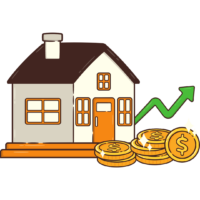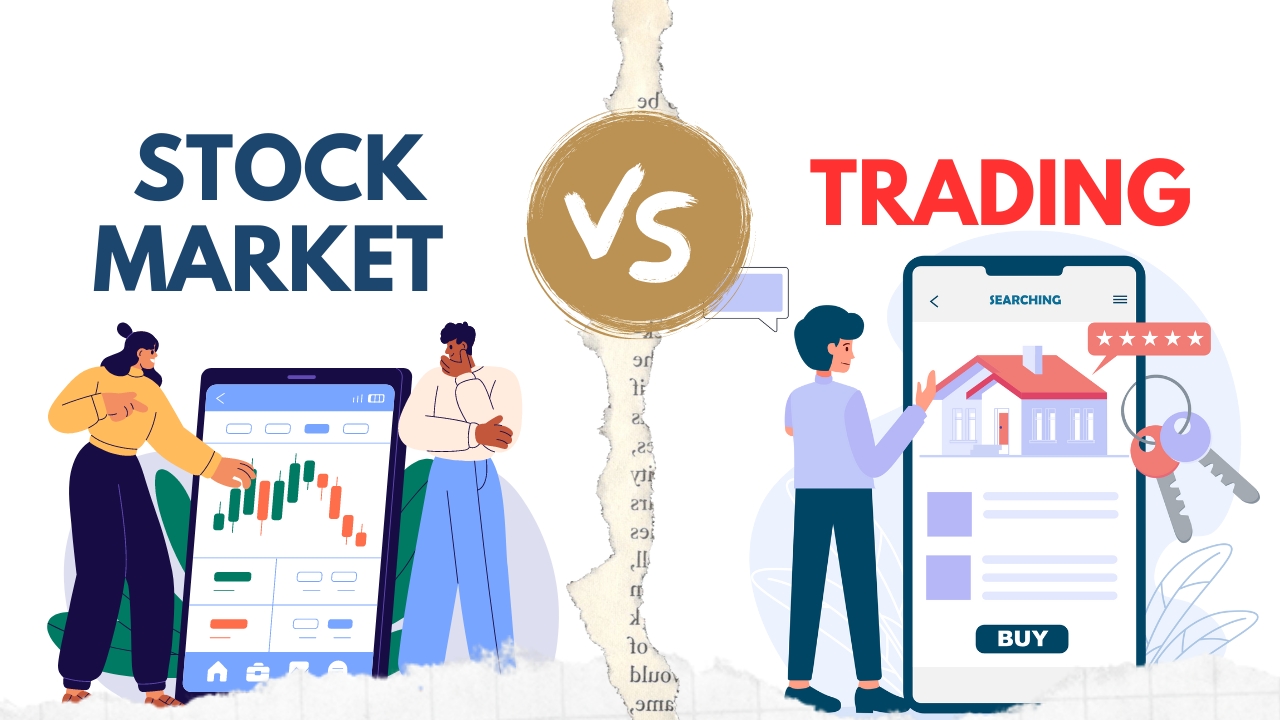Stock Market vs Real Estate: When it comes to growing wealth, two major avenues that investors often explore are the stock market and real estate. Both have their own unique advantages and risks, making it essential to understand what each can offer before making a decision.
Introduction
The decision between investing in stocks and real estate is a pivotal one. In this article, we’ll dive into the benefits, risks, and key differences between these investment options, helping you make an informed choice.
Understanding the Stock Market

Before we compare, let’s get a grasp of what the stock market entails. It’s a platform where you buy and sell shares of companies. The potential for growth and profit is substantial but comes with its own set of risks.
How Stocks Generate Returns
Stocks offer returns through capital appreciation and dividends. Appreciating in value means that as companies grow, so does the stock price. Dividends provide a regular income stream from profitable companies.
The Risk Factor in Stock Investments
Stock investments can be volatile. Market fluctuations can lead to both substantial gains and losses. Understanding this volatility is crucial for investors.
Also Read: How to Interpret Stock Market Predictions and Forecasts Like a Pro!
Exploring Real Estate Investments

Real estate, on the other hand, involves purchasing properties for rental income or future resale. It’s a different ball game with its own set of challenges and rewards.
The Benefits of Real Estate
Real estate investments can offer steady rental income and potential appreciation in property value. These investments can also provide tax benefits and diversify your investment portfolio.
The Challenges of Real Estate
Investing in real estate requires significant capital and involves hands-on management. There are also risks, like property depreciation and market downturns.
Comparative Analysis: Stock Market vs Real Estate
Now that we have a basic understanding of each, let’s compare them side by side.
Flexibility and Liquidity
Stocks are generally more liquid than real estate, allowing for quick buying and selling. Real estate is less flexible and can take time to sell a property.
Risk and Reward Profiles
Stocks offer higher potential returns but come with higher volatility. Real estate provides stable, albeit potentially lower, returns with a different risk landscape.
Investment Horizon and Commitment
Stock investments may require less time and commitment compared to the hands-on management of real estate properties.
Economic and Market Factors
Understanding the broader economic and market factors that impact each investment type is essential.
Economic Impact on Stocks
The stock market is influenced by economic indicators, interest rates, and corporate earnings. A strong economy can boost stock prices, while downturns can lead to losses.
Impact of Economic Conditions on Real Estate
Real estate is affected by factors like interest rates, population growth, and regional economic health. These elements can significantly impact property values and rental yields.
Must Read: How Economic Events Send Stocks Soaring or Sinking!
Making the Decision: Factors to Consider
Choosing between stocks and real estate involves several considerations.
Personal Financial Goals
What are your investment goals? Are you looking for quick returns or steady income? Your financial objectives will guide your decision.
Investment Time Frame
What is your investment horizon? Are you planning for short-term gains or long-term wealth accumulation?
Risk Tolerance
What is your risk appetite? Stocks are riskier but offer higher returns, while real estate provides steadier returns with moderate risk.
Capital Investment
How much capital do you have? Real estate generally requires a larger upfront investment compared to stocks.
Conclusion
Deciding between stock market and real estate investments depends on your financial situation, risk tolerance, and investment goals. Both offer opportunities for wealth growth, but they come with different paths and challenges.
FAQs
Is the stock market riskier than real estate?
Stocks tend to have higher volatility and risk compared to real estate, which offers a more stable return but has its own set of challenges.
Can you make money with real estate without being actively involved?
Yes, through real estate investment trusts (REITs), you can invest in real estate and receive income without the need for active management.
How do taxes differ between stocks and real estate?
Real estate investments may provide tax benefits like deductions for mortgage interest and property depreciation, whereas stocks are generally taxed based on capital gains and dividends.
What is a better option for short-term investments: stocks or real estate?
Stocks are generally better for short-term investments due to their liquidity and volatility, which can lead to quicker gains or losses.
Are there ways to invest in real estate with less capital?
Yes, through real estate crowdfunding platforms, or REITs, you can invest in real estate with lower capital requirements.
Disclaimer: The information provided in this article is for educational and informational purposes only. It should not be considered as financial advice. Investing in the stock market or real estate involves risks, including the potential loss of principal. Before making any investment decisions, please consult with a qualified financial advisor or investment professional. Each individual’s financial situation is unique, and investments should be made based on personal risk tolerance, financial goals, and investment horizon.
Hello guys! My name is David Wilson, and I'm a passionate stock market enthusiast and the founder of 9to5Stock. With a deep understanding of market dynamics and a commitment to empowering others, I share valuable insights, strategies, and updates to help investors like you make informed decisions and achieve financial success. Welcome to our community, and let's thrive together in the world of investing!
